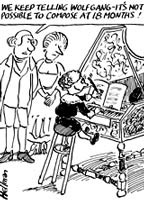The creative process
‘Creative training’ is the latest trend for large companies. But you can’t teach someone to be creative; it is a talent you either do or don’t have.

Is creativity an inherent quality or can it be taught? I pose the question not because I have a desire to be the Henry Higgins of the design industry, I simply want to revisit an age-old debate which is taking on a new significance in the light of the trend towards “creativity training” within multinational manufacturers and even media owners.
It’s fantastic that at last real value is being attached to the currency of creativity, with some pundits predicting the imminent appointment of board members with a “creativity” remit within major corporations. However, I am yet to be persuaded that you can train a person to be creative in the way you can train them to use an Excel spreadsheet or deliver an annual appraisal.
What is meant by the C word? Ask a handful of creative directors and the responses will vary from “making something out of nothing” to “a passion to do something different”, to “seeing the unseen”. But they agree that creativity demands vision, resourcefulness, passion, and a never-ending ability to surprise. All of these are surely things which are more innate talents than skills which are acquired. There is a tendency to equate “creativity” with artistic ability, I believe the two are separate. For instance, my mother says she is not creative, by which she means she finds it difficult to find cushions that match the sofa.
Creative people are those who make new things happen – they don’t have a monopoly on ideas, everyone has ideas. The difference is that creative people find a way to put their ideas into practice. Ask any of the respected academics like Jack Gardner at Somerset or Ray Gregory at Norwich, and they’ll tell you that while you can nurture creative talent, you can’t magically endow someone who is lacking creative inclination. That’s why there are great graduates and not so great graduates. I’m a confirmed doubting Thomas when it comes to formal creative training sessions. I feel a lot of the time that the output is often preordained, with participants led towards particular solutions. There is too much emphasis placed on “spontaneity”, which in itself, can devalue creativity because very often it can take some time to arrive at a strong creative solution.
To my mind, the notion of a dedicated “creative training” session is a contradiction in itself. How can you gather a group of people in a room and expect to extract creative thoughts? Saying the first word that comes into your head or trying to think of 20 different uses for a clothes hanger might generate a sense of camaraderie among the group, but don’t tell me it ignites a creative spark, which will burn long after the session is over. I’m sure Madonna and William Orbit don’t toss balls at each other to prompt the next lyric. Picasso certainly never read a book called Thinking Out Of The Box and Stanley Kubrick is unlikely to have used Plasticine and pipe cleaners as a source of inspiration for Clockwork Orange. If you say these examples trivialise “creativity training” then I would counter argue that “creativity training” actually trivialises the whole creative profession. My concern is that design consultancies are increasingly being asked to participate or, indeed, orchestrate “creativity sessions”, which can run the risk of demeaning what it is that we do.
If there is a time in one’s life when creativity could and should be nurtured it’s during early childhood. If, as adults and parents we cut out the criticism and stopped telling children “it’s not possible”, and instead provided an environment which allows for an alternative approach, then perhaps we could protect and encourage creative thinking from an early age. But, I’m afraid that for most adults it’s too difficult to rid yourself of accepted constraints.
While I really do applaud those businesses which are thinking much more seriously about the whole issue of creativity, I suggest that the emphasis should be placed more on creative “appreciation” than creative training. Encourage a belief in the value of creativity, how to identify great creative talent, how to motivate a creative mind, and how to evaluate their output. As Michael Wolff (an inherently creative individual) advocates: great brands live in the Room Of The Unknowing. I’m yet to be convinced that the unknown can ever be satisfactorily taught. I’m prepared to stick my neck out on this subject and say that creativity is a talent, not a skill. You either have it or you don’t, if you fall into the latter category, then I suggest you learn to appreciate rather than emulate your creative brethren.
-
Post a comment



